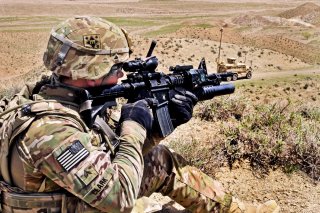U.S. Special Operations Forces Are Getting Ready for War with Russia or China
For nearly twenty years, the U.S. military’s SOF have been engaged in counterterrorism and counterinsurgency efforts, but now must rethink how to address the changing threats of the twenty-first century including a potential conflict with other great powers.
Last month U.S. and Ukrainian special operations forces (SOF) took part in a training exercise dubbed Fiction Urchin, which was part of a multinational exercise that involved ten allied and partner nations. It consisted of special forces operators conducting fast rope insertion and extraction systems—the typical “all in a day’s work” type of exercises that we’ve come to expect from our special forces.
However, those days may be coming to an end.
For nearly twenty years, the U.S. military’s SOF have been engaged in counterterrorism and counterinsurgency efforts, but now must rethink how to address the changing threats of the twenty-first century including a potential conflict with other great powers--with a clear focus on Russia or China. Earlier this month, military leaders, commanders and thinkers in the United States’ SOF addressed the challenges faced by the changing world at the annual National Defense Industrial Association Special Operations/Low Intensity Conflict (SO/LIC) conference, reported the MilitaryTimes.
While the SOF operator fast-roping isn’t likely going away anytime soon, the roles could be greatly expanded—with a team that includes hackers and those with language and thinking skills, and perhaps even accompanied by automated drone combat sidekicks.
In other words, SOF could almost resemble an “Ocean’s 11” style team.
Countering China and Russia
SOF operators have had to use very blunt tactics during the ongoing war on terror over the past two decades, but the great power competition with China and Russia could be very different as China has engaged in cyber and economic warfare, while Russia had engaged in misinformation campaigns.
Acting Assistant Defense Secretary for SO/LIC Ezra Cohen stated at the recent conference that the Pentagon must shift towards great power competition but at the same not completely abandon its focus on deterrence and high-end conflict. Many of the irregular warfare lessons and practices used over the past two decades will remain very relevant, albeit altered to address the new global political landscape.
“We must adapt and institutionalize those skills in ways that challenge our adversaries’ strategies and shape the competitive landscape to our advantage,” Cohen explained.
“Indeed, our adversaries have proven that irregular activities can proactively shape the environment to their advantage, all below the threshold at which we are likely to respond with conventional force,” he added.
In addition, the U.S. military must heed the lessons learned over the past seventy-five years and accept the so-called “irregular character” of the conflicts it enters. Cohen noted, “Our doctrine, acquisition and training for conflict is excessively focused on maintaining deterrence or winning the high-end conventional war fight, when the simple reality is that modern warfare is not nearly that clear-cut.”
Test Bed for Innovation
To address the challenges, the U.S. Special Operations Command (SOCOM), which has historically served as a testbed for innovation, must continue to evaluate new technologies before a conflict forces the use of untested tactics, techniques, and procedures.
This could involve great adoption of technology including artificial intelligence (AI) and machine learning, and SOCOM has already enrolled a number of personnel in an AI program at the Department of Defense’s (DoD’s) Joint Artificial Intelligence Center.
The SOF of tomorrow must begin to evolve, suggested Cohen.
“As it stands today, the force is not reflective of our larger society — a fact that should give us all pause. Barriers exist that prevent us from accessing full population segments and their unique skills and perspectives — effectually leaving needed talent outside of our formations,” he added. “The contest for influence and legitimacy will require diverse perspectives and new ideas that resonate among relevant audiences. This is especially true as the department attempts to coordinate and integrate its operations in the information environment against foreign propaganda and disinformation.”
Peter Suciu is a Michigan-based writer who has contributed to more than four dozen magazines, newspapers and websites. He is the author of several books on military headgear including A Gallery of Military Headdress, which is available on Amazon.com.
Image: Flickr.

